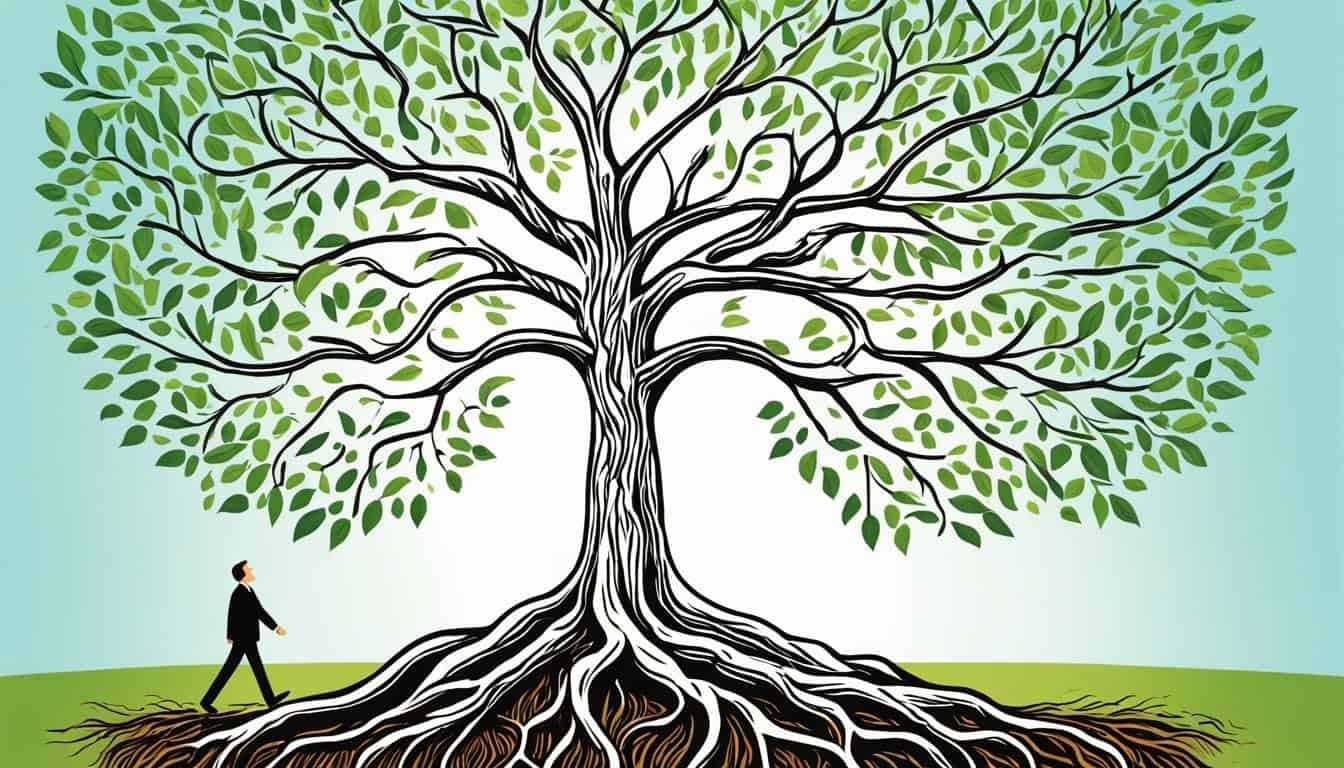Top Growth Insights – Lessons from Brian Tracy
“Success is not the result of spontaneous combustion. You must set yourself on fire.”
Brian Tracy, a renowned author, and motivational speaker, has empowered countless individuals with his transformative teachings. Through his wealth of experience and wisdom, Tracy has shared invaluable insights and success principles that can propel personal and professional growth. In this article, we will explore the lessons from Brian Tracy that can inspire and guide individuals on their journey toward success and fulfillment.
Key Takeaways:
- Learn to think in terms of solutions and cultivate a problem-solving mindset.
- Develop clarity by setting clear goals and having a clear vision for the future.
- Practice forgiveness to let go of the past and experience personal transformation.
- Dare to dream big and overcome limitations to achieve greatness.
- Learn from setbacks and view failures as opportunities for growth.
Think In Terms of Solutions
When faced with challenges, Brian Tracy teaches us to adopt a problem-solving mindset and think in terms of solutions. Instead of getting stuck in the negativity of problems, he encourages us to shift our focus towards finding ways to overcome them. By redirecting our energy and thoughts to seek solutions, we pave the way for success in both our personal and professional lives.
Tracy’s teachings emphasize the importance of embracing a success mindset centered around problem-solving. Rather than dwelling on the obstacles in our path, we are encouraged to approach them as opportunities for growth and development. This shift in perspective allows us to tap into our problem-solving abilities and find innovative solutions.
“The best way to predict your future is to create it.” – Brian Tracy
Achieving success requires us to develop a problem-solving mindset that focuses on solutions. By adopting this approach, we become proactive in seeking ways to overcome challenges and obstacles. This mindset empowers us to take control of our circumstances and find creative solutions that lead to personal and professional growth.
The Benefits of Thinking in Terms of Solutions
By embracing a problem-solving mindset and thinking in terms of solutions, we can experience several benefits:
- Overcoming challenges: When faced with obstacles, thinking in terms of solutions enables us to overcome them effectively and efficiently. It empowers us to find innovative ways to navigate through difficult situations.
- Success mindset: Adopting a solution-oriented approach shifts our focus from problems to opportunities. It cultivates a positive mindset that propels us forward towards success.
- Growth and development: Thinking in terms of solutions promotes personal and professional growth. It encourages us to expand our knowledge, skills, and capabilities to overcome challenges.
Embracing a problem-solving mindset, as advocated by Brian Tracy, is crucial for overcoming challenges and achieving success. By shifting our perspective and focusing on finding solutions, we unlock our full potential, enabling us to overcome any obstacle that comes our way.
| Solutions vs. Problems | Benefits |
|---|---|
| Problems | Focuses on the negative |
| Solutions | Redirects energy towards positive outcomes |
| Problems | Can lead to feeling overwhelmed and stuck |
| Solutions | Opens up possibilities for growth and progress |
| Problems | Tend to hinder progress and success |
| Solutions | Empowers individuals to overcome challenges |
Develop Clarity
In the journey toward personal growth and success, one of the most crucial lessons we can learn from Brian Tracy is the significance of developing clarity. Tracy emphasizes the importance of setting clear goals and having a clear vision for the future. By understanding what we want to achieve and where we want to go, we can align our actions and decisions with our desired outcomes, propelling us toward personal growth and fulfillment.
When we have clarity, we have a sense of purpose. It allows us to focus our efforts on what truly matters to us, rather than getting lost in the noise and distractions of daily life. By setting clear goals, we create a roadmap for our journey, providing us with direction and a sense of purpose. With a vision for the future firmly in place, we can make intentional choices and take steps that align with our desired outcomes.
Clarity also provides us with motivation and inspiration. When we have a clear vision of what we want to achieve, we are more likely to stay committed and motivated, even in the face of challenges. It gives us a sense of meaning and fulfillment, as we work towards something that is truly important to us. Clarity fuels our determination, helping us persevere and overcome obstacles on the path to personal growth.
“The future belongs to the competent. Get good, get better, be the best!” – Brian Tracy
Developing clarity is not always easy, but it is worth the effort. It requires introspection and self-reflection to truly understand our values, passions, and aspirations. Taking the time to identify our core values and what truly drives us can provide a solid foundation for setting meaningful goals and creating a vision for the future.
Here are some practical steps to develop clarity:
- Reflect on your values and priorities: Take a moment to contemplate what truly matters to you and align your goals with your core values. This will ensure that your actions are in harmony with your beliefs and aspirations.
- Create SMART goals: Set specific, measurable, achievable, relevant, and time-bound goals that align with your vision for the future. This will help you stay focused and track your progress.
- Visualize your success: Imagine yourself achieving your goals and living your desired future. Visualizing success can provide clarity and inspire you to take action.
- Break down big goals into smaller milestones: Divide your goals into smaller, more manageable tasks. This will make them less overwhelming and allow you to track your progress more easily.
- Seek support and guidance: Surround yourself with mentors, coaches, or like-minded individuals who can provide support and guidance on your journey toward clarity and personal growth.
By developing clarity, setting goals, and having a clear vision for the future, we can ignite our personal growth and pave the way for a fulfilling and successful life.
Forgiveness
In the pursuit of personal growth and emotional freedom, forgiveness plays a pivotal role. Brian Tracy, a renowned expert in personal development, places great emphasis on the power of forgiveness and the act of letting go of the past. He firmly believes that holding onto grudges and nursing resentment only serves to keep us stuck in a cycle of negativity, hindering our ability to achieve personal transformation and success.
Forgiveness allows us to release the burdens of past hurts and grievances, freeing ourselves from the emotional baggage that weighs us down. By choosing to forgive, we open ourselves up to new possibilities and opportunities for growth. It is through embracing forgiveness that we can experience genuine emotional freedom and embark on a journey of personal transformation.
Forgiveness is not about condoning the actions or behavior of others; rather, it is about liberating ourselves from the pain and negativity associated with those experiences. It is a powerful act of self-healing and empowerment. When we forgive, we choose to relinquish the grip that the past has on us, allowing ourselves to focus on the present moment and create a better future.
“Forgiveness is the fragrance that the violet sheds on the heel that has crushed it.” – Mark Twain
Through forgiveness, we develop the resilience and strength needed to overcome the challenges that come our way. By letting go of the past, we make room for personal growth and transformation to take place. Forgiveness enables us to break free from the chains of resentment and bitterness, paving the way for deep healing and inner peace.
Letting go of the past is a fundamental aspect of forgiveness, and it is through this release that we create space in our hearts and minds for personal transformation to occur. As Brian Tracy teaches, forgiveness is an essential step towards achieving emotional freedom and finding true fulfillment in our lives.
The Benefits of Forgiveness
Forgiveness offers numerous benefits that contribute to our personal growth and well-being. Here are some key advantages:
- Emotional Freedom: By forgiving, we liberate ourselves from the negative emotions tied to past experiences, allowing us to experience greater emotional freedom and peace of mind.
- Healing and Inner Peace: Forgiveness is a powerful tool for healing emotional wounds and finding inner peace. It enables us to let go of anger, resentment, and pain, fostering a sense of harmony within ourselves.
- Improved Relationships: Choosing to forgive others can strengthen relationships and promote healthier connections. It fosters empathy, understanding, and a deeper sense of compassion towards others.
- Personal Growth: Forgiveness is a catalyst for personal growth and transformation. It empowers us to break free from limiting beliefs and patterns, opening the door to new possibilities and opportunities.
- Enhanced Well-Being: As we release the negative emotions associated with past grievances, forgiveness contributes to overall well-being, reducing stress, anxiety, and promoting a more positive mindset.
The Path to Forgiveness
While forgiveness may not always come easily, it is a journey worth embarking on. Here are some steps you can take towards forgiveness:
- Recognize and acknowledge the pain and emotions associated with past hurts.
- Choose to let go and release the resentment and anger that may be holding you back.
- Practice empathy and try to understand the perspectives and motivations of others involved.
- Engage in self-reflection and examine how holding onto grudges impacts your well-being.
- Visualize the benefits of forgiveness and the positive impact it can have on your life.
- Take small steps towards forgiveness, allowing yourself time to heal and process.
- Seek support from loved ones, therapists, or support groups to navigate the forgiveness journey.
Remember, forgiveness is a personal choice and a gift you give to yourself. It is a powerful act of self-compassion and self-care that opens the doors to personal growth and emotional freedom.
| Benefits of Forgiveness | |
|---|---|
| Emotional Freedom | The liberation from negative emotions tied to past experiences. |
| Healing and Inner Peace | Powerful tool for healing emotional wounds and finding harmony within. |
| Improved Relationships | Strengthens relationships and promotes empathy and understanding. |
| Personal Growth | A catalyst for personal growth, breaking free from limiting beliefs. |
| Enhanced Well-Being | Reduces stress, anxiety, and fosters a more positive mindset. |
Dare to Dream Big
When it comes to achieving greatness, Brian Tracy encourages individuals to dare to dream big. He firmly believes that with the right mindset and unwavering determination, anyone can overcome their limitations and accomplish extraordinary things. Tracy’s teachings inspire individuals to set ambitious goals that push them beyond their comfort zones, propelling them toward their dreams and aspirations.
Dreaming big is not just about wishful thinking; it’s about setting a vision for one’s life and believing in the possibility of achieving it. By embracing this mindset, individuals can unlock their full potential and tap into their innate abilities.
“Dreaming big is the first step towards turning the invisible into the visible.” – Brian Tracy
By dreaming big, individuals challenge themselves to expand their horizons and venture into uncharted territory. They set their sights on goals that may initially seem out of reach but are ultimately attainable with consistent effort and dedication. It is through this audacious pursuit of their dreams that individuals can discover their true capabilities and achieve greatness.
When setting ambitious goals, it’s natural to encounter obstacles and limitations along the way. However, Tracy empowers individuals to overcome these challenges and persevere in the face of adversity. He encourages them to develop resilience and embrace failure as an opportunity for growth. By viewing setbacks as valuable lessons, individuals can adjust their strategies, learn from their experiences, and ultimately move closer to their dreams.
Tracy’s teachings also emphasize the importance of believing in one’s ability to succeed. Self-belief is a powerful force that acts as a catalyst for transformation and achievement. By cultivating a positive mindset and having faith in their own capabilities, individuals can overcome self-doubt and external limitations, paving the way for remarkable accomplishments.
As Brian Tracy shares in his teachings, the journey towards achieving greatness starts with a daring dream. It is through dreaming big, setting ambitious goals, overcoming limitations, and believing in oneself that individuals can unleash their full potential and make their dreams a reality. So, dare to dream big, and watch as the extraordinary unfolds.
| Benefits of Dreaming Big | Steps to Overcome Limitations |
|---|---|
|
|
| Keys to Setting Ambitious Goals | Tips for Achieving Greatness |
|
|
Learn from Setbacks
Setbacks and failures are an inevitable part of the journey to success. Brian Tracy, a renowned personal development expert, understands the importance of learning from these experiences. Tracy teaches the value of resilience and having a growth mindset, allowing individuals to turn failures into opportunities for growth and improvement.
When faced with setbacks, it is crucial to view them as valuable lessons rather than insurmountable obstacles. Embracing a growth mindset means believing that setbacks are not the end but rather stepping stones to success. By reframing failures as opportunities to learn and improve, individuals can bounce back stronger and continue working towards their goals.
Tracy’s teachings remind us that setbacks are not indicators of our worth or potential. Instead, they present valuable learning opportunities that can foster personal growth and development. When we approach setbacks with a positive mindset, we build resilience, a trait that allows us to persevere through challenges and setbacks.
Resilience: Bouncing Back Stronger
Resilience is the ability to adapt and bounce back from setbacks. It involves developing a mental toughness that enables us to navigate difficult circumstances with determination and perseverance. By learning from setbacks, we cultivate resilience, allowing us to face future challenges with confidence and strength.
A growth mindset is a key driver of resilience. It is the belief that our abilities and intelligence are not fixed but can be developed through effort and learning. Embracing this mindset empowers us to see failures as temporary setbacks, encouraging continuous growth and improvement.
Tracy encourages individuals to maintain a positive outlook when faced with setbacks. Instead of dwelling on perceived failures, he advises focusing on the lessons learned and using them as stepping stones towards success. By adopting this mindset, individuals become better equipped to navigate and overcome future challenges.
Turning Failures into Opportunities
Tracy believes that within every failure lies the seeds of opportunity. It is through setbacks that we gain valuable insights and develop the resilience necessary to succeed. By analyzing our failures, we can identify areas for improvement and fine-tune our approaches.
Tracy’s teachings emphasize the importance of embracing failures as opportunities for growth. By taking the time to reflect on our setbacks, we can extract valuable lessons that inform future actions. This mindset shift allows us to see failures not as roadblocks but as stepping stones towards personal and professional growth.
Ultimately, learning from setbacks is an essential part of the journey towards success. By developing resilience, embracing a growth mindset, and turning failures into opportunities, individuals can unlock their full potential and achieve their goals.
The Power of Asking
In his teachings, Brian Tracy emphasizes the power of asking as a key strategy for success. Whether it’s seeking opportunities, honing negotiation skills, or taking initiative, Tracy believes that asking is a vital tool in achieving one’s goals.
When it comes to seeking opportunities, Tracy encourages individuals to be proactive and not be afraid to put themselves out there. By asking for what they want, whether it’s a promotion, collaboration, or a chance to showcase their skills, individuals can open doors to new possibilities and create their own success.
Furthermore, Tracy emphasizes the importance of developing negotiation skills. By asking questions, actively listening, and respectfully advocating for their interests, individuals can navigate through conversations and negotiations effectively. This enables them to secure favorable outcomes and forge mutually beneficial agreements.
Taking the initiative is another aspect Tracy highlights in his teachings. Rather than waiting for opportunities to fall into their laps, individuals are encouraged to take the initiative by asking for what they want. Whether it’s volunteering for new projects, suggesting innovative ideas, or expressing their ambitions, taking action can lead to personal and professional growth.
Tracy believes that by asking politely and respectfully, individuals can open doors to new opportunities and increase their chances of success.
The power of asking lies not only in the potential opportunities it can unlock, but also in the growth mindset it fosters. By stepping out of one’s comfort zone and asking for what they want, individuals can cultivate self-confidence and overcome fears of rejection. This willingness to ask paves the way for personal and professional development, propelling individuals toward their desired achievements.
| The Power of Asking Benefits | Description |
|---|---|
| Seeking Opportunities | Asking for opportunities can lead to new possibilities and career advancements. |
| Negotiation Skills | Asking and negotiating effectively can lead to mutually beneficial agreements and favorable outcomes. |
| Taking Initiative | Initiating actions and asking for what one wants can foster personal and professional growth. |
The power of asking is a valuable skill that individuals can develop to accelerate their success journey. By embracing the power of asking, individuals can proactively seek opportunities, sharpen their negotiation skills, take initiative, and unlock new possibilities.
Finding Balance and Simplifying Life
Creating a harmonious balance between work and personal life is an essential lesson taught by Brian Tracy. In today’s fast-paced world, achieving work-life balance can be challenging, but it is crucial for overall well-being and happiness. Tracy emphasizes the importance of prioritizing self-care, setting boundaries, and simplifying life to find this balance.
By prioritizing self-care, individuals can ensure their physical and mental health are taken care of. Self-care activities such as exercise, meditation, and hobbies help recharge and rejuvenate, allowing individuals to bring their best selves to both work and personal life.
“Simplicity is the ultimate sophistication.” – Brian Tracy
Tracy advises individuals to simplify their lives by focusing on what truly matters. By decluttering both their physical and mental space, individuals can eliminate unnecessary distractions and create room for what brings them joy and fulfillment. Prioritization plays a crucial role in simplifying life, and Tracy suggests identifying the most important tasks and goals, working on them first, and letting go of the non-essential.
To achieve work-life balance, setting boundaries is vital. It involves defining clear guidelines and limits for work-related responsibilities, ensuring that personal time is protected and respected. Disconnecting from work during personal time allows individuals to fully engage in and enjoy their personal life without the stress and pressure of work-related tasks.
By finding balance and simplifying life, individuals can lead happier and more fulfilling lives. They can experience increased productivity and efficiency in their work while also having more quality time for themselves and their loved ones. The pursuit of work-life balance is an ongoing journey, and Brian Tracy’s teachings provide valuable insights and strategies to help individuals find that delicate equilibrium.
Conclusion
Throughout his extensive body of work, Brian Tracy has provided invaluable lessons and insights that have guided countless individuals on their personal and professional journeys. By applying Tracy’s teachings on thinking in terms of solutions, developing clarity, forgiveness, dreaming big, learning from setbacks, the power of asking, finding balance, and simplifying life, individuals can embark on a path of growth, success, and fulfillment.
Tracy’s success principles serve as a roadmap for personal development and professional achievement. Whether it’s adopting a problem-solving mindset, setting clear goals, or cultivating resilience in the face of setbacks, Tracy’s wisdom offers practical strategies for overcoming challenges and reaching new heights.
By drawing inspiration from Brian Tracy, individuals can tap into their inner potential and unlock the doors to greater success and personal growth. Tracy reminds us that consistent action, continuous personal development, and a positive mindset are vital elements in the pursuit of our goals. As we implement Tracy’s teachings, we empower ourselves to embrace change, seize opportunities, and thrive in all aspects of life.
Source Links
- https://medium.com/@srishti.sadhu/brian-tracys-guide-how-to-become-a-self-made-millionaire-65516f9c97ba
- https://www.linkedin.com/pulse/key-insights-leadership-lessons-from-legend-brian-tracy-jeff-davis
- https://www.linkedin.com/pulse/15-amazing-lessons-i-learned-from-brian-tracys-book-nidal-khaznadar








